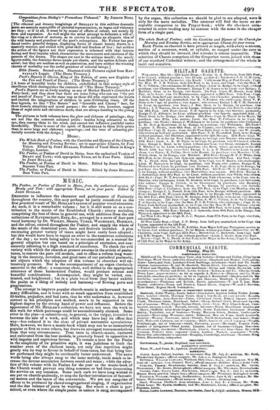M USIC.
The Psalter, or Psalms of David in Metre, from the authorized version of Brady and Tate with appropriate Tunes, set in four parts. Edited by JOHN HUZZAH.
DESIGNED to influence the character and performance of Psalmody throughout the country, this may perhaps be justly considered as the first practical result of Mr. Buizsitt's system of popular vocal education. As such, it is a remarkable volume ; but it is still more so as a con- tribution to the music of the Established Church : ninety melodies, comprising the best of those in general use, with additions from the old collections of RAVENSCROPT, ESTE, &e., arranged in Et SCOTe of four-part vocal harmony by Dr. WESLEY, Messrs. Tum.r., WALMISLEY, HORSLEY, and the editor, extend throughout the Psalter, and supply the whole of
the music of the dominical year, fasts and festivals included. A plan embracing greater variety of tunes might have easily been adopted ; but this would have been to repeat an error in the numerous collections of the day ; no work being safely to be recommended as a manual for general adoption but one based on a principle of exclusion, and con sistently adhering to a high standard of excellence. To check the evil variety with which the charchat present swarms in the article of psalm.
tunes, to restore the pure old models, and to effect a reform long want- ing in the decency, devotion, and good taste of our parochial psalmody, are objects which the adoption of this volume in churches will ex-
tensively promote. Nor is the accompaniment of an organ absolutely essential to the effect : a numerous choir, well drilled in the appropriate utterance of these harmonized Psalms, would produce solemn and beautiful combinations. Accompanied, they might be varied, con- trasted, and heightened ; but in a plain vocal form they better exhibit the psalm as a thing of melody and harmony—of flowing parts and progressions. The attempt to improve popular church-music is embarrassed by so many difficulties, and is beset with so much opposition from established ill,-habits, prejudice, and bad taste, that he who undertakes it, however correct in his principles and method, needs to be supported in the highest degree by the strong hand of power and influence. Before the appearance of Mr. Human's collection, we have not seen the work in this walk for which patronage could be unconditionally claimed. Some error in the plan—a subserviency, in general, to the vulgar, intended to increase the sale of a work, and which may have had its effect that way—has reduced it to the class of private mercantile speculations. Here, however, we have a music-book which may not be so extensively popular at first as some others, but draws its strongest recommendations from that very circumstance. True taste in church-music, nurtured and cultivated from the best models, is generally found in opposition to wild impulse and capricious favour. To restore a love for the Psalm
in the simplicity of Its primitive style, it was judicious to limit the number even of the choicest tunes, not only that repetition might
gently win its way to favour in behalf of these tunes, but that being bet- ter performed they might be continually better understood. The same words being also always sung to the same melody, tends much Loin.
crease the devout association between sound and sense ; while the adop- tion of this volume with its Psalms for the year as the music-book of the Church would prevent any thing common or bad from desecrating the service on any occasion. Some such curb we have long wished to see put on church-psalmody, to stop the further introduction of fantasti- cal metres and the tunes of the conventicle. We are not sanguine of effects to be produced by choral congregational singing, if organization and the due balance of parts be wanting. But where a choir is per- mitted, or even where the simple psalm. in tusison is sang,accompanied
by the organ, this collection we should be glad to see adopted, were only for the mere melodies. The amateur will find the score an aet■ ceptable companion to his Prayer-book ; while the chorister unin- structed in score-reading may be content with the same in the cheaper form of a single part.


























 Previous page
Previous page